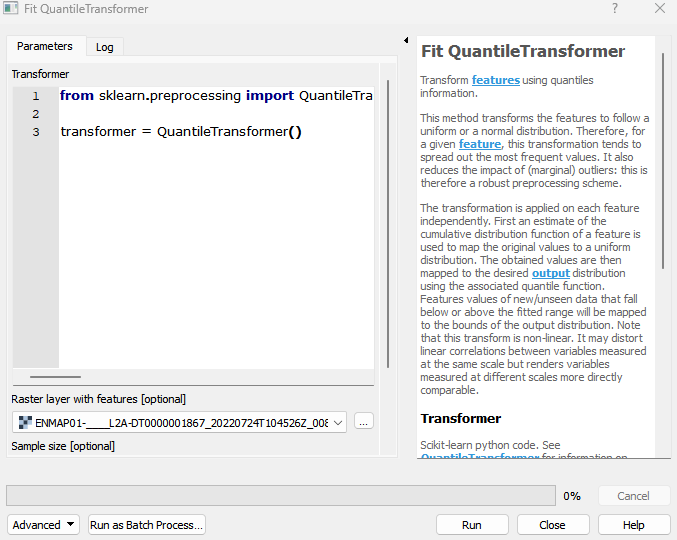Fit QuantileTransformer
Transform features using quantiles information. This method transforms the features to follow a uniform or a normal distribution. Therefore, for a given feature, this transformation tends to spread out the most frequent values. It also reduces the impact of (marginal) outliers: this is therefore a robust preprocessing scheme. The transformation is applied on each feature independently. First an estimate of the cumulative distribution function of a feature is used to map the original values to a uniform distribution. The obtained values are then mapped to the desired output distribution using the associated quantile function. Features values of new/unseen data that fall below or above the fitted range will be mapped to the bounds of the output distribution. Note that this transform is non-linear. It may distort linear correlations between variables measured at the same scale but renders variables measured at different scales more directly comparable.
Usage:
Start the algorithm from the Processing Toolbox panel.
Select a raster layer to process and click run.

Parameters
- Transformer [string]
Scikit-learn python code. See QuantileTransformer for information on different parameters.
Default:
from sklearn.preprocessing import QuantileTransformer transformer = QuantileTransformer()
- Raster layer with features [raster]
Raster layer with feature data X used for fitting the transformer. Mutually exclusive with parameter: Training dataset
- Sample size [number]
Approximate number of samples drawn from raster. If 0, whole raster will be used. Note that this is only a hint for limiting the number of rows and columns.
Default: 1000
- Training dataset [file]
Training dataset pickle file used for fitting the transformer. Mutually exclusive with parameter: Raster layer with features
Outputs
- Output transformer [fileDestination]
Pickle file destination.
Command-line usage
>qgis_process help enmapbox:FitQuantiletransformer:
----------------
Arguments
----------------
transformer: Transformer
Default value: from sklearn.preprocessing import QuantileTransformer
transformer = QuantileTransformer()
Argument type: string
Acceptable values:
- String value
- field:FIELD_NAME to use a data defined value taken from the FIELD_NAME field
- expression:SOME EXPRESSION to use a data defined value calculated using a custom QGIS expression
featureRaster: Raster layer with features (optional)
Argument type: raster
Acceptable values:
- Path to a raster layer
sampleSize: Sample size (optional)
Default value: 1000
Argument type: number
Acceptable values:
- A numeric value
- field:FIELD_NAME to use a data defined value taken from the FIELD_NAME field
- expression:SOME EXPRESSION to use a data defined value calculated using a custom QGIS expression
dataset: Training dataset (optional)
Argument type: file
Acceptable values:
- Path to a file
outputTransformer: Output transformer
Argument type: fileDestination
Acceptable values:
- Path for new file
----------------
Outputs
----------------
outputTransformer: <outputFile>
Output transformer